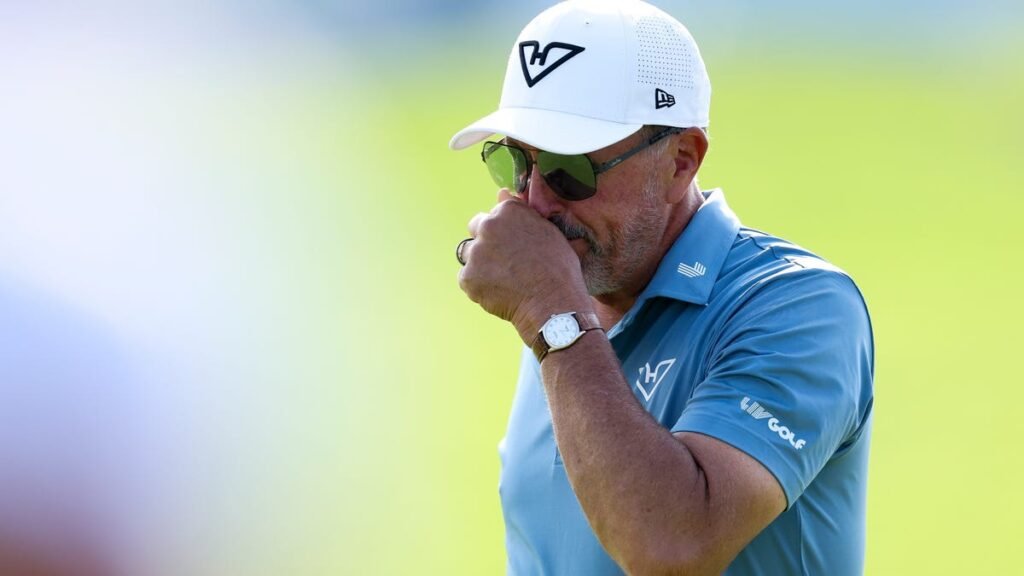OAKMONT, Pa. — By the time Phil Mickelson signed his second-round scorecard at Oakmont Country Club, he had accounted for 8,704 strokes in his U.S. Open career. Most of those were routine, many of them sublime, a smattering excruciatingly painful, none moreso than the half-dozen he struck on the 72nd hole at Winged Foot in 2006. Friday’s 74 — which included two double-bogeys down the stretch to miss the cut by a single shot — was his 120th round in his 34th tilt at the national title. It was also potentially his last, and if it proves so, then it draws to a close his tortured relationship with a tournament that has come to define both his career and his character.
It may seem audacious to suggest that a man who owns three Masters, two PGA Championships and an Open is defined by the one major he didn’t win, but the U.S. Open represents more than just an empty space in a Southern California trophy room, save for his six silver medals. It’s the event that cemented the perception of Mickelson as a family man (Pinehurst, ’99), as a putative rival to Tiger Woods (Bethpage, ’02), as a hapless but gracious hero with no lay-up in him (Winged Foot, ’06), as a populist entertainer gamely battling stringent course set-ups designed to punish his aggressive style (All of ‘em, ’90-’25).
But it’s also the event that exposed his antagonistic attitude toward golf’s authorities and saw the early unraveling of his carefully cultivated ‘Aw shucks’ image.
To be exact, that moment came with his 7,277th and most memorable stroke in the Open, when he hockeyed a moving ball on the 13th green at Shinnecock Hills in the third round seven years ago. It was more than just the frustration of a score going sideways or of another chance to complete the career grand slam ebbing away. It was an admission that the U.S. Open had finally broken him. That angry swipe — and his brazen defense of it — was a Foxtrot Uniform to the USGA. “I’ve had multiple times when I’ve wanted to do that, and I finally did,” he told Curtis Strange afterward.
The years since have cemented a new public perception of Mickelson that is wholly unflattering. His reputation among fans was sundered when he explicitly said he was willing to overlook murder and human rights abuses by his “scary motherf’er” benefactors in Saudi Arabia if doing so gave him leverage over the PGA Tour to enrich himself. His standing in the locker room (never stellar) is positively fecal since he filed suit on behalf of LIV, claiming every entity in the game and some of his former colleagues were illegally conspiring against the Saudi enterprise. Now starved of the high-profile platform he used to enjoy, he satisfies himself with mild social media trolling, like his suggestion in March that Scottie Scheffler wouldn’t win before the Ryder Cup (he has, three times). That was at least a break from his stream of far-right fever swamp posts about California taxes and how only citizens are entitled to due process (presumably when, just for example, they’re caught up in insider trading investigations).
Mickelson competed at Oakmont on the final year of an exemption earned by winning the ’21 PGA Championship, but he has pathways to play future Opens. A strong finish in another major would earn an invitation — feasible at the Masters (where his institutional knowledge led to an improbable T-2 finish a couple years ago) or the British Open (which rewards two traits he has in abundance, imagination and guile). He could enter qualifying or win the U.S. Senior Open, which he’s never entered. But his most likely avenue is a special exemption from the USGA.
He actually received such an invitation in ’21 but ultimately didn’t need it when he won that PGA Championship. Much has changed in four years, however, and since these exemptions are goodwill gestures and most often reserved for former Open champions, savvy readers will immediately see two barriers to Mickelson obtaining one. His relationship with every non-Saudi entity in the sport is toxic, particularly the USGA. Only a couple years ago he said the organization was guilty of a “dick move” for not admitting Talor Gooch to the Open, which is less insulting when one realizes that Mickelson accusing anyone of a dick move is akin to having Michelangelo praise your brushwork.
The USGA’s chief championships officer, John Bodenhamer, was asked about the possibility of a special pass. “We would review things for Shinnecock ahead of next year and look at all of those possibilities and evaluate it from there,” he replied. “I think the way that we would also think of Phil is we hope he earns his way in, and I think he’d tell you the same thing.”
For those conversant in the nomenclature of the USGA, that roughly translates as, “Good luck, pal.”
So it seems probable that we witnessed the end of Mickelson’s long, tumultuous U.S. Open journey on this overcast Friday evening in front of muted spectators. Perhaps a Hall of Famer who has made many iconic contributions to this championship deserved a more fitting send-off, but decisions, actions and words have consequences.
Like so many previous U.S. Opens, Phil Mickelson has only himself to blame for how disappointingly things ended.
Read the full article here


